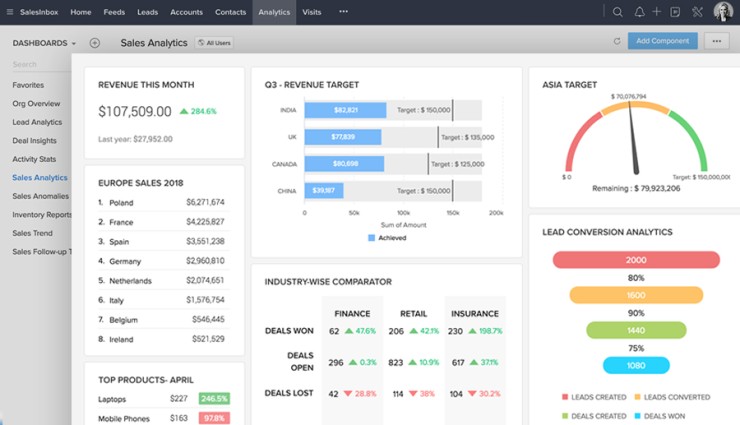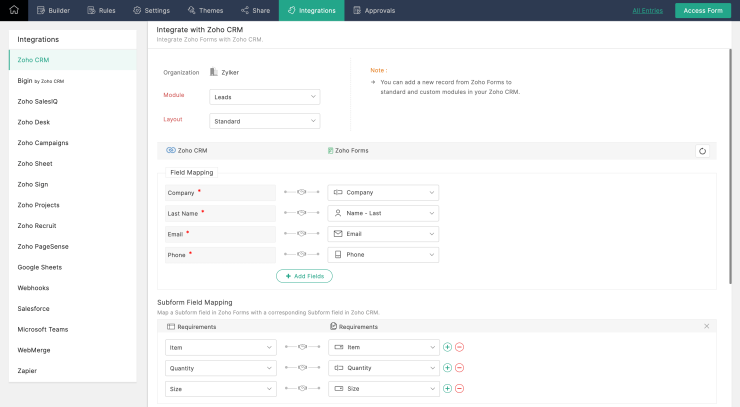Zoho CRM constituye una solución integral para la gestión de relaciones con clientes, orientada a centralizar la información comercial en una única plataforma basada en la nube. Esta herramienta facilita la captura y el seguimiento de leads, el almacenamiento de datos de contactos y la administración detallada de oportunidades, permitiendo a las organizaciones disponer de una visión unificada y actualizada del ciclo de ventas.

La plataforma incorpora funcionalidades que optimizan los procesos internos a través de la automatización de tareas y la personalización de flujos de trabajo. Con herramientas para programar seguimientos, gestionar interacciones y configurar procesos de ventas adaptados a las necesidades específicas de cada negocio, se simplifica la coordinación entre equipos comerciales y se mejora la eficiencia operativa. Además, su capacidad de integración con aplicaciones de correo, redes sociales y otros servicios impulsa una gestión omnicanal que asegura la continuidad de las operaciones.
Zoho CRM también ofrece opciones avanzadas de análisis y reportes que permiten evaluar el rendimiento de las estrategias comerciales mediante indicadores clave y paneles personalizables. La conexión con otros módulos del ecosistema Zoho y la posibilidad de integrar servicios de terceros fomentan una expansión funcional acorde al crecimiento y la complejidad del negocio, convirtiéndolo en una herramienta adaptable para empresas de diversos tamaños y sectores.
Es una aplicación Cloud, de configuración y uso sencillo, y pago por suscripción mensual. El precio de la suscripción a Zoho CRM es por usuario, y la tarifa depende de la modalidad de uso, o las funcionalidades que se utilizan.
Dispone de una suscripción gratuita y sin límite de tiempo para 3 usuarios que es perfectamente funcional como CRM básico en modo Cloud. Para organizaciones pequeñas esta versión gratuíta puede ser suficiente, y siempre se puede ampliar la funcionalidad en caso de necesidad.
Principales funcionalidades de Zoho CRM
Automatización de la fuerza de ventas
Gestión de Leads, Contactos, Cuentas y Oportunidades para mejorar las ventas automatizando tareas, mejorando el flujo de trabajo, definiendo reglas propias y centrando esfuerzos en la creación y captura de Oportunidades.
Incluye la creación de formularios web para la captura de Leads, y automatización del Workflow y de tareas de marqueting. Mediante Workflows, se definen reglas que disparan acciones automáticas (envío de emails, asignación de tareas, actualización de campos) ante eventos —por ejemplo, cambio de etapa o recepción de respuesta de un lead—. Con Blueprint se modelan procesos de venta paso a paso, obligando a completar campos y respetar aprobaciones antes de avanzar de fase.
Seguimiento de ventas
Cuadros de mando, informes de ventas y facilidades analíticas para realizar un completo seguimiento del camino desde la generación de oportunidades hasta la conversión en ventas. Incluye seguridad basada en roles, gestión del territorio y previsión de ventas.
El pipeline de ventas se configura por etapas según la metodología de la empresa (BANT, MEDDIC, etc.). Los responsables pueden arrastrar y soltar oportunidades entre fases, asignar probabilidades de cierre y fechas estimadas, y visualizar alertas cuando un trato permanece demasiado tiempo en una etapa concreta.
Conversación por múltiples canales
Social CRM para asociar perfiles de redes sociales con perfiles de contactos o leads del CRM.
Envío de comunicaciones por email y control de resultados desde el propio CRM, registro de datos de llamadas telefónicas, y chat en directo con visitantes de la web.
Funcionalidades de Colaboración en equipo para la fuerza de ventas
Seguimiento de actividades
Registro de tareas, eventos y llamadas asociadas con registros del CRM
Seguimiento de visitas a la web, con notificaciones inmediatas para iniciar un chat si se estima conveniente.
Integración con Google AdWords
Extensiones del CRM
Personalización del producto, API y desarrollo de Apps y funciones personalizadas.
Módulo de Soporte al cliente con registro de Casos y Soluciones relativos al uso de productos o servicios.
Módulo de Gestión de documentos
Integración
Integración con otros productos Zoho como Zoho Campaigns, Zoho Reports, Zoho Projects, Zoho SalesIQ, Zoho Support, Zoho Survey, Zoho Invoice o Zoho Creator.
Plug-ins para Microsoft Office y Microsoft Outlook
Zoho Phonebridge para call centers, con conectores para Twilio, Ringio, Avaya, Asterisk y Elastix.
Integración con Google Apps para Gmail, Google Calendar, Google Tasks, Google Contact y web Forms para Google Sites

Inteligencia artificial con Zia
Zia analiza patrones de interacción, historial de ventas y datos externos para ofrecer:
-
Predicciones de cierre: probabilidad de que una oportunidad se convierta.
-
Mejor momento para contactar: horario óptimo basado en respuesta histórica.
-
Detección de anomalías: avisos tempranos cuando el pipeline muestra comportamientos atípicos.
-
Sugerencias de tareas: recomendaciones de acciones próximas (follow‑up, llamada, demo).
Movilidad
Dispone de versiones móviles para continuar el seguimiento de las actividades de venta, o consultar información de clientes desde dispositivos Android, iPad y iPhone. Las apps para iOS y Android ofrecen acceso completo a leads, cuentas, tareas y eventos, incluso sin conexión. Las modificaciones se sincronizan al reconectar, garantizando actualización instantánea de datos y continuidad de las actividades de campo.
Reporting y paneles interactivos
Los dashboards personalizables muestran métricas clave (tasa de conversión, valor del pipeline, rendimiento por representante) con gráficos de barras, líneas o embudo. El generador de informes permite combinar módulos y filtros avanzados para extraer informes a medida, exportables en PDF, XLS o como widgets embebibles.
Seguridad y cumplimiento
Ofrece control de acceso granular mediante perfiles, roles y reglas de compartir registros. Incluye autenticación de dos factores (2FA), cifrado en reposo y en tránsito, y cumplimiento de normativas como GDPR y CCPA.
Características técnicas de Zoho CRM
Zoho CRM constituye una plataforma integral para la gestión de interacciones comerciales, unificando la información de clientes, leads y oportunidades en un entorno basado en la nube. Su diseño modular y adaptable permite configurar flujos de trabajo, automatizar procesos y facilitar el análisis en tiempo real de las actividades comerciales, lo que garantiza flexibilidad para empresas de distintos tamaños y sectores.
La arquitectura modular y la integración robusta con el ecosistema Zoho y otras aplicaciones de terceros posibilitan la consolidación de datos provenientes de múltiples canales. La solución admite configuraciones personalizadas mediante APIs y conectores preestablecidos, facilitando la interconexión con ERP, sistemas de marketing y herramientas de comunicación. Esta conectividad propicia flujos de información homogéneos y una operatividad centralizada que optimiza la gestión empresarial.
El núcleo de la automatización inteligente reemplaza procesos manuales por workflows ajustables, lo que posibilita la asignación automática de leads y la gestión eficiente de contactos. Funcionalidades orientadas al análisis predictivo y a la generación de informes ofrecen insights relevantes para la toma de decisiones estratégicas, dinamizando el rendimiento de los equipos comerciales mediante datos en tiempo real.
La experiencia de usuario destaca por una interfaz intuitiva y la elevada personalización de módulos. La configuración de formularios dinámicos, la edición de paneles de control adaptados a roles específicos y la disponibilidad de aplicaciones móviles aseguran un acceso permanente a información actualizada, promoviendo la productividad en entornos con alta movilidad y flexibilidad operativa.
La incorporación de inteligencia artificial, a través de la herramienta Zia, potencia el análisis de patrones de comportamiento y la recomendación de acciones proactivas. Algoritmos avanzados procesan volúmenes de datos significativos para identificar oportunidades y sugerir estrategias ajustadas a cada segmento de clientes, aportando ventajas competitivas en un mercado en constante evolución.
La extensibilidad mediante Zoho Creator y los conectores del Marketplace posibilita la creación de módulos, campos y aplicaciones a medida sin necesidad de código, así como la integración con sistemas externos (ERP, plataformas de e‑commerce, herramientas de atención al cliente). Esta capacidad de adaptación flexibiliza la plataforma según los requerimientos específicos de cada sector.
Fortalezas y debilidades de Zoho CRM
| Fortalezas | Debilidades |
|---|---|
| Variedad de herramientas: Amplio conjunto de aplicaciones integradas que cubren diversas necesidades empresariales y permiten centralizar la gestión de clientes. | Curva de aprendizaje pronunciada: La amplitud funcional exige tiempo y formación para aprovechar todas sus capacidades. |
| Integración sencilla: Capacidad para conectar de forma fluida con otras soluciones tanto propias del ecosistema Zoho como de terceros, facilitando la sincronización de datos. | Soporte al cliente limitado: Algunos usuarios reportan tiempos de respuesta prolongados y ciertas limitaciones en la asistencia, especialmente en español. |
| Alta personalización y escalabilidad: Se pueden adaptar módulos, flujos de trabajo y paneles para ajustarse a procesos específicos y crecer conforme a las necesidades de la empresa. | Limitaciones en funciones avanzadas: Algunas herramientas o integraciones especializadas requieren la contratación de planes más altos o desarrollos a medida. |
| Automatización de procesos: Permite configurar workflows para tareas repetitivas y optimizar la atención de leads y oportunidades, aumentando la eficiencia operativa. | Dependencia de conexión a internet: Al tratarse de una solución en la nube, la falta de conectividad afecta el acceso y la actualización de datos. |
| Estructura tarifaria competitiva: Ofrece planes flexibles que se adaptan a distintos tamaños de empresa, manteniendo una buena relación costo-beneficio. | Integración con sistemas externos complejos (ERP, legacy) puede requerir conectores o desarrollo a medida |
| Alta extensibilidad con Zoho Creator y Marketplace | Rendimiento puede degradarse en bases de datos muy voluminosas si no se optimizan vistas y filtros |
Licenciamiento e instalación
Zoho CRM ofrece un modelo de licenciamiento por suscripción escalable, que incluye ediciones Standard, Professional, Enterprise y Ultimate, cada una con niveles crecientes de automatización, análisis y capacidades de inteligencia artificial.
La versión gratuíta para 3 usuarios es perfecta para pequeñas empresas, que siempre tendrán la posibilidad de ampliar la suscripción en caso de considerarlo necesario. Las pymes o empresas más grandes seguramente van a requerir alguna de las funcionalidades de las ediciones de pago, pero pueden comenzar igualmente por lo básico con la versión Free, e ir ampliando funcionalidades cambiando a alguna de estas ediciones.
Zoho ofrece también las versiones de prueba gratuíta de 15 días de las ediciones de pago, que se puede activar desde el mismo entorno de la Free Edition.
Está orientado a empresas de todos los tamaños: las pymes suelen optar por las ediciones Standard o Professional por su equilibrio entre coste y funcionalidad, mientras que organizaciones medianas y grandes se decantan por Enterprise o Ultimate para beneficiarse de la extensibilidad y la potencia de Zia.
En cuanto al tipo de instalación, Zoho CRM se entrega principalmente como servicio SaaS en la nube, garantizando actualizaciones automáticas y alta disponibilidad; además, a través de Zoho Creator y conectores privados, puede desplegarse en nubes privadas o entornos híbridos para cumplir requisitos de seguridad y control de datos.
Referencias
Página oficial de Zoho CRM: Zoho CRM
- Printer-friendly version
- Log in to post comments

